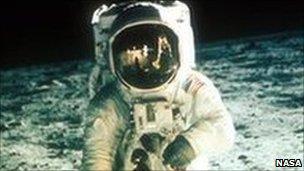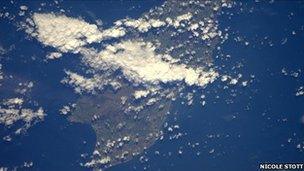Isle of Man: A small nation's race to the moon
- Published

In 2010, the Isle of Man was named the fifth most likely nation to put the next person on the moon
The Isle of Man had its first brush with the international commercial space industry in 2001, and less than 10 years later it was named the fifth most likely nation to put the next person on the moon.
Only the United States, Russia, China and India were ranked ahead in a report released by industry analyst Ascend.
The island's meteoric rise in the space sector may have seemed unlikely to many, but another more recent publication confirmed a growing reputation for punching above its weight.
A report last May by business research organisation the Institute of Directors (IoD) said: "In the new space economy, you can be small and succeed. You don't need astronauts to be in the space business. The Isle of Man has built a powerful industry niche for other countries to follow."
Buzz Aldrin
The island's emerging status in an international industry worth about $300bn a year has come as a surprise for many, even for those at the helm.
The government's director of space commerce, Tim Craine, said: "This journey has been quite surreal at times. On one business visit to the States I found myself having breakfast with Buzz Aldrin.

This Isle of Man from space photograph was taken by Nicole Stott
"The important thing is that we were networking with the space and satellite industry at an early stage, as well as offering tax advantages, we have developed a reputation for being a good place to do business because we are committed to the sector."
The island's journey into space began in 2001, when the government entered into an agreement with local firm Mann Sat to file for select orbital positions and radio frequencies with the International Telecommunications Union in Geneva.
The director of this firm was Isle of Man resident Chris Stott, husband of NASA astronaut Nicole. He brought the island into close contact with the global space sector in preparation for the introduction of the zero rate of corporate tax in 2006.
The island now hosts more than 30 space companies and so far the industry has pulled £35m directly into the Manx exchequer - a figure set to rise over the billion mark in five years.
Earlier this month, one Manx-based operation, Excalibur Almaz (EA), announced it would be ready to take passengers on private lunar expeditions by 2015.
The company has purchased four disused Russian space capsules and two space stations which will be refurbished ready for the mission.
Company founder Art Dula said: "It would be historic - we plan to go further than the Apollo programme, further than any human beings have ever been before."
The trips, which will last between six and eight months, will be open to space tourists and cost in the region of $30m (£20m) for a full orbital trip around the earth, and $100m (£65m) for a trip to the moon and back.
"We went to the experts and they told us we could expect to be approached by about 29 or 30 people willing to pay that amount of money to go past the moon," said Mr Dula.
"It's a fundamentally life-changing experience, they will receive full astronaut training and they will operate the space craft themselves, we are not going to send one of our employees with them, we don't need to because the space crafts are like private yachts."
Competition for commercial space travel is high and the sector is extremely crowded, but the vision for the Isle of Man has now been clarified - it means to make the transition from putting satellites into space to putting people into space.
- Published25 May 2012
- Published27 April 2011
- Published3 February 2011